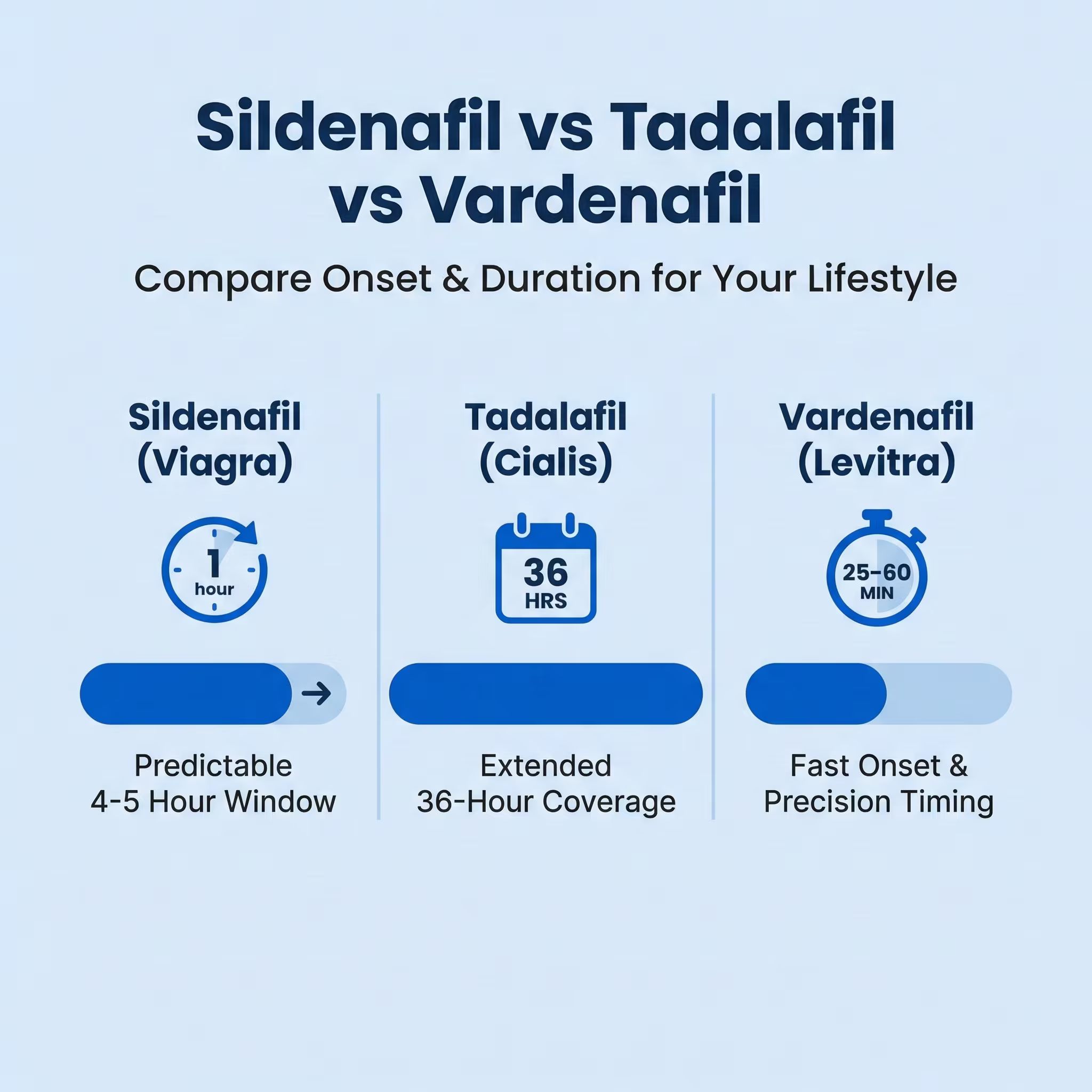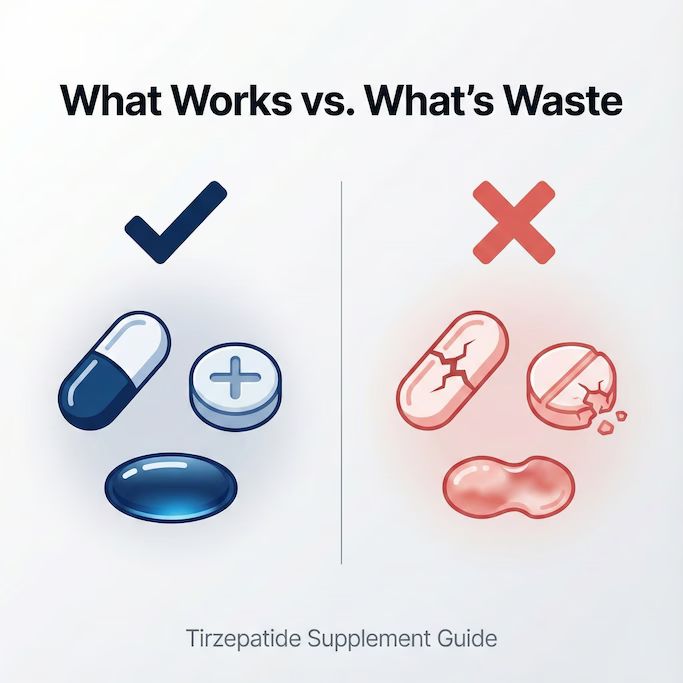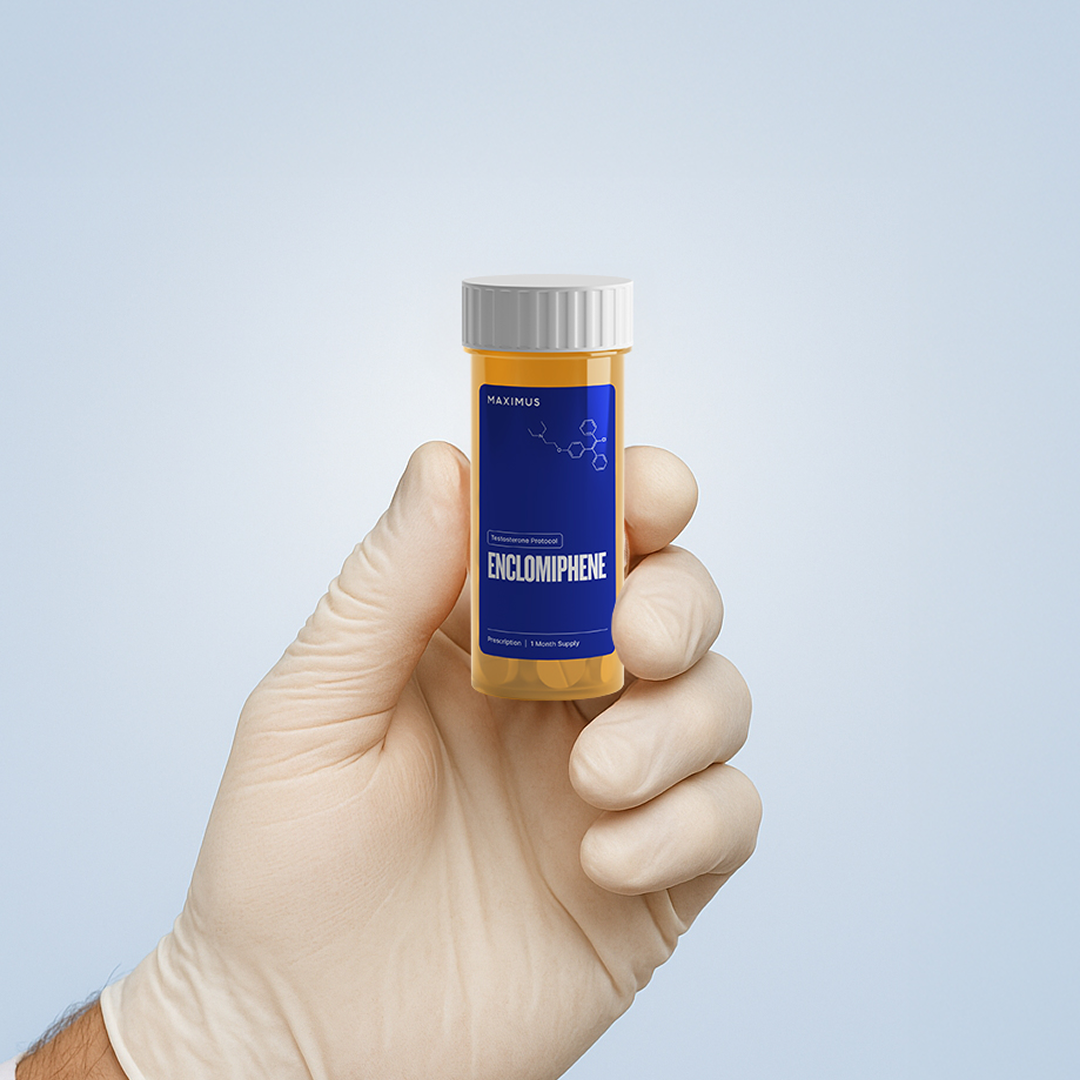Key takeaways:
- Enclomiphene is a prescription medication that increases testosterone while improving markers of semen health.
- The medication can produce results within 14 days and should be taken long term to maintain efficacy.
- Studies on clomiphene citrate, which contains enclomiphene, suggest it is a safe and effective long-term treatment for low testosterone.
- Enclomiphene does not require cycling and is safe for long-term use without suppressing testosterone production.
When you’re dealing with the telltale signs of low testosterone, like decreased sex drive, fatigue, or increased body fat, it can be tempting to consider testosterone replacement therapy (TRT). But if you’re hoping to have kids one day, long-term TRT use can make it significantly more difficult, but not impossible.
Enclomiphene presents an appealing alternative to TRT, improving your body’s ability to produce testosterone while simultaneously improving sperm production. But can you use enclomiphene long term? Read on to find out.
What is enclomiphene?
Belonging to a class of drugs known as selective estrogen receptor modulators (SERMs), enclomiphene citrate is a medication that affects how estrogen works in your body. By binding to estrogen receptors in the brain, it sets off a chain reaction that amps up the production of luteinizing hormone (LH) and follicle stimulating hormone (FSH), leading to an increase in testosterone and sperm.
Is enclomiphene as effective as TRT?
In a study comparing enclomiphene to TRT, researchers found that while both of these testosterone treatments increased testosterone, more than half (54%) of men on topical TRT had low sperm count at the end of the study.
Why take enclomiphene long term?
Enclomiphene can increase testosterone levels within 14 days, but it should be taken long-term to maintain results. This is because when you stop taking enclomiphene, your T levels simply return to baseline. However, T levels continue to stay high for at least one week after stopping treatment. This can be useful for those who miss a dose or two during treatment, as it won’t cause any significant side effects.
There is not a considerable amount of research available on the long-term use of enclomiphene alone, but there is research into the long-term use of clomiphene citrate, which contains enclomiphene.
In a study involving 400 patients who took clomiphene for more than three years, researchers found that 88% achieved healthy functioning gonads, 77% reported improved symptoms, and only 8% reported side effects (none of which were harmful).
In conclusion, the researchers deemed clomiphene to be a safe and effective long-term treatment for low testosterone.
These findings are in sharp contrast to what occurs with long-term TRT usage. While TRT works quickly, raising T levels within a few days and improving symptoms in as little as three weeks, it also must be taken long-term to maintain its efficacy.
But, unlike enclomiphene, coming off TRT results in a rapid and dramatic decrease in testosterone levels because natural testosterone production has been shut down over the duration of therapy.
As one Harvard researcher put it, “There is a bit of a testosterone trap” as men start TRT and feel better, but then feel significantly worse when they come off, setting them up for dependency.
Long-term TRT use also increases the chances of experiencing infertility and other adverse side effects like shrinking testicles, increased blood thickness, and breast growth.
Does enclomiphene have long-term side effects?
In the review of studies on long-term clomiphene use cited in the previous section, the side effects that occurred in 8% of subjects were mostly mild in nature and included mood changes, blurred vision, and breast tenderness.
However, it’s important to note that clomiphene and enclomiphene do not have the same chemical makeup and these reported side effects may have more to do with another isomer in clomiphene called zuclomiphene.
Zuclomiphene is different from enclomiphene in that it works as an estrogen agonist, which means it increases estrogen in the body. Studies comparing enclomiphene and clomiphene have found that the clomiphene stays in the body far longer and has persistent side effects that last beyond the drug’s therapeutic effects.
Side effects associated with short-term enclomiphene use are considered mild and rare, including symptoms like headaches and nausea. Overall, studies have found the medication to be well tolerated with few adverse effects, though it may pose risks for individuals with a history of blood clots or heart disease.
While long-term data is still limited, emerging evidence suggests that patients using enclomiphene for up to 3 years continue to tolerate it well. Reported side effects over that period were mostly unspecified (66.25%), with weight gain (10%), changes in libido (3.75%), and symptoms like allergic reaction, acne, and mood changes (each 2.5%) occurring infrequently. Rare reports included fatigue, joint pain, elevated heart rate, hair loss, and nausea (each 1.25%).
Until more robust research on long-term use becomes available, early trends continue to suggest a favorable safety profile for enclomiphene.
Enclomiphene cycling: yes or no?
Cycling refers to periodically stopping a compound to avoid desensitization or maintain sensitivity. While this concept exists in hormone therapy, there’s no evidence that cycling enclomiphene or clomiphene offers any benefit. These medications are well tolerated with continuous use and don’t require breaks to remain effective.
Enclomiphene doesn’t need to be cycled. It’s safe for long-term use, doesn’t suppress testosterone production, and continues to provide benefits without desensitization or drop-off in effect.
Since this is a prescription medication, a doctor will determine the right dosage and monitor your usage, potentially making adjustments along the way. Enclomiphene works by naturally increasing testosterone while improving fertility markers, helping you maintain healthy levels over the long term.
To learn more about enclomiphene and determine if it’s right for you, read about the Maximus Enclomiphene Protocol.
Reviewed by Gabriel Alizaidy, MD, MS
----
Disclaimer: The contents of this article, including, but not limited to, text, graphics, images, and other information, is for information purposes only and does not constitute medical advice. The information contained herein is not a substitute for and should never be relied upon for professional medical advice. The content is not meant to be complete or exhaustive or to be applicable to any specific individual's medical condition. You should consult a licensed healthcare professional before starting any health protocol and seek the advice of your physician or other medical professional if you have questions or concerns about a medical condition. Always talk to your doctor about the risks and benefits of any treatment. Never disregard or delay seeking professional medical advice or treatment because of something you have read on this site. Maximus does not recommend, endorse, or make any representation about the efficacy, appropriateness, or suitability of any specific test, products, procedures, treatments, services, opinions, healthcare providers or other information contained herein. Maximus is not responsible for, nor will they bear any liability for, the content provided herein or any actions or outcomes resulting from or related to its use.
----
References
- Thomas, J., Suarez Arbelaez, M. C., Narasimman, M., Weber, A. R., Blachman-Braun, R., White, J. T., Ledesma, B., Ghomeshi, A., Jara-Palacios, M. A., & Ramasamy, R. (2023). Efficacy of Clomiphene Citrate Versus Enclomiphene Citrate for Male Infertility Treatment: A Retrospective Study. Cureus, 15(7), e41476. https://doi.org/10.7759/cureus.41476
- Kohn, T. P., Louis, M. R., Pickett, S. M., Lindgren, M. C., Kohn, J. R., Pastuszak, A. W., & Lipshultz, L. I. (2017). Age and duration of testosterone therapy predict time to return of sperm count after human chorionic gonadotropin therapy. Fertility and sterility, 107(2), 351–357.e1. https://doi.org/10.1016/j.fertnstert.2016.10.004
- Wexler, T. L. (2014). Enclomiphene citrate improves hormone levels while preserving sperm production in men with secondary hypogonadism. Fertility and Sterility, 102(3), 720–727. https://www.medcentral.com/endocrinology/hormones/enclomiphene-citrate-improves-hormone-levels-while-preserving
- Wiehle, R., Cunningham, G. R., Pitteloud, N., Wike, J., Hsu, K., Fontenot, G. K., Rosner, M., Dwyer, A., & Podolski, J. (2014). Enclomiphene citrate stimulates serum testosterone in men with low testosterone within 14 days. Journal of Men's Health, 11(4), 196–205. https://doi.org/10.1089/jomh.2014.0006
- Wiehle, R., Cunningham, G. R., Pitteloud, N., Wike, J., Hsu, K., Fontenot, G. K., Rosner, M., Dwyer, A., & Podolski, J. (2013). Testosterone Restoration by Enclomiphene Citrate in Men with Secondary Hypogonadism: Pharmacodynamics and Pharmacokinetics. BJU international, 112(8), 1188–1200. Advance online publication. https://doi.org/10.1111/bju.12363
- Krzastek, S. C., Sharma, D., Abdullah, N., Sultan, M., Machen, G. L., Wenzel, J. L., Ells, A., Chen, X., Kavoussi, M., Costabile, R. A., Smith, R. P., & Kavoussi, P. K. (2019). Long-Term Safety and Efficacy of Clomiphene Citrate for the Treatment of Hypogonadism. The Journal of urology, 202(5), 1029–1035. https://doi.org/10.1097/JU.0000000000000396
- Shoskes, J. J., Wilson, M. K., & Spinner, M. L. (2016). Pharmacology of testosterone replacement therapy preparations. Translational andrology and urology, 5(6), 834–843. https://doi.org/10.21037/tau.2016.07.10
- Saad, F., Aversa, A., Isidori, A. M., Zafalon, L., Zitzmann, M., & Gooren, L. (2011). Onset of effects of testosterone treatment and time span until maximum effects are achieved. European journal of endocrinology, 165(5), 675–685. https://doi.org/10.1530/EJE-11-0221
- LeWine, H. E. (n.d.). Is testosterone therapy safe? Take a breath before you take the plunge. Harvard Health Publishing. Retrieved July 9, 2025, from https://www.health.harvard.edu/mens-health/is-testosterone-therapy-safe-take-a-breath-before-you-take-the-plunge










